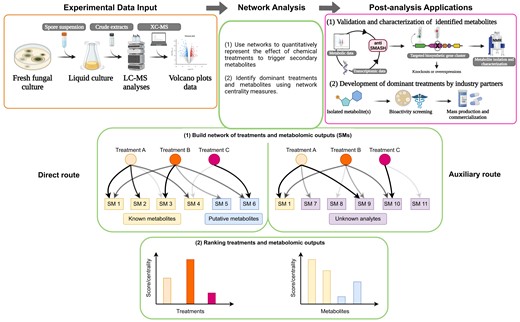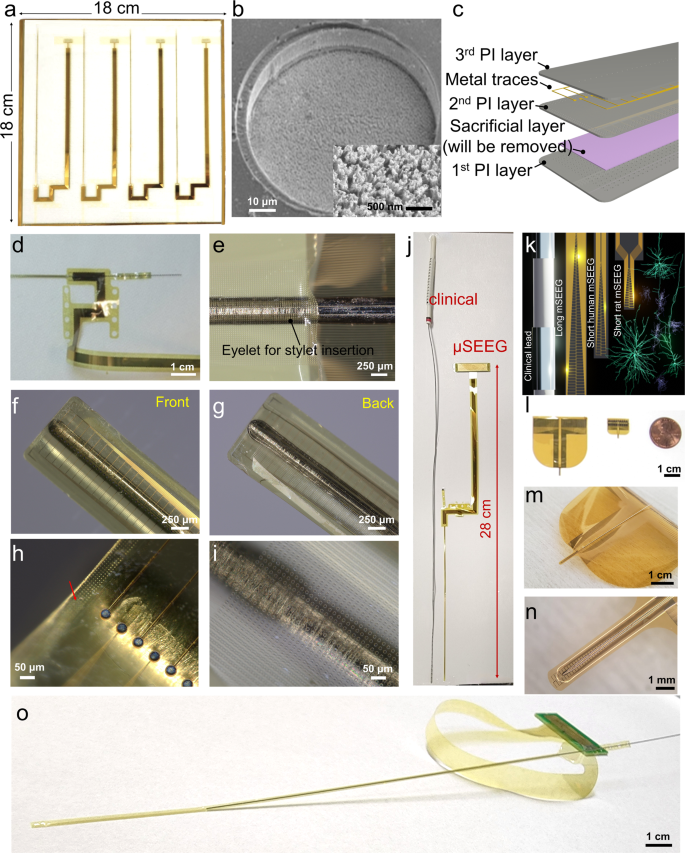2024-01-17 オークリッジ国立研究所(ORNL)
◆グラフ理論を使用したデータ駆動の手法を利用し、キノコが生成する特化した代謝物の生産に影響を与える化合物や環境ストレスを分析しました。これにより、特化した代謝物の同定が迅速化され、これらの代謝物の植物への影響を理解するための大規模で効果的な方法が提供されました。
◆研究は、植物と微生物の相互関係を探求するORNLのPlant-Microbe Interfaces Scientific Focus Areaプロジェクトの一環で、土壌の生態系におけるバイオエネルギー生産、環境浄化、土壌炭素貯蔵に関連する課題に取り組んでいます。
<関連情報>
- https://www.ornl.gov/news/fungal-bouncers-patrol-plant-microbe-relationship
- https://academic.oup.com/pnasnexus/article/2/10/pgad322/7286277
- https://journals.asm.org/doi/10.1128/msystems.01052-22
真菌のメタボロミクスの深淵を垣間見る:新規ネットワーク解析により外因性化合物とそのアウトプットとの関係が明らかになる A glimpse into the fungal metabolomic abyss: Novel network analysis reveals relationships between exogenous compounds and their outputs
Muralikrishnan Gopalakrishnan Meena, Matthew J Lane, Joanna Tannous, Alyssa A Carrell, Paul E Abraham, Richard J Giannone, Jean-Michel Ané, Nancy P Keller, Jesse L Labbé, Armin G Geiger,David Kainer, Daniel A Jacobson, Tomás A Rush
PNAS Nexus Published:29 September 2023
DOI:https://doi.org/10.1093/pnasnexus/pgad322

Abstract
Fungal specialized metabolites are a major source of beneficial compounds that are routinely isolated, characterized, and manufactured as pharmaceuticals, agrochemical agents, and industrial chemicals. The production of these metabolites is encoded by biosynthetic gene clusters that are often silent under standard growth conditions. There are limited resources for characterizing the direct link between abiotic stimuli and metabolite production. Herein, we introduce a network analysis-based, data-driven algorithm comprising two routes to characterize the production of specialized fungal metabolites triggered by different exogenous compounds: the direct route and the auxiliary route. Both routes elucidate the influence of treatments on the production of specialized metabolites from experimental data. The direct route determines known and putative metabolites induced by treatments and provides additional insight over traditional comparison methods. The auxiliary route is specific for discovering unknown analytes, and further identification can be curated through online bioinformatic resources. We validated our algorithm by applying chitooligosaccharides and lipids at two different temperatures to the fungal pathogen Aspergillus fumigatus. After liquid chromatography–mass spectrometry quantification of significantly produced analytes, we used network centrality measures to rank the treatments’ ability to elucidate these analytes and confirmed their identity through fragmentation patterns or in silico spiking with commercially available standards. Later, we examined the transcriptional regulation of these metabolites through real-time quantitative polymerase chain reaction. Our data-driven techniques can complement existing metabolomic network analysis by providing an approach to track the influence of any exogenous stimuli on metabolite production. Our experimental-based algorithm can overcome the bottlenecks in elucidating novel fungal compounds used in drug discovery.
リポキトオリゴ糖が細菌の増殖を制御する特殊な真菌代謝物プロファイルを誘導する Lipo-Chitooligosaccharides Induce Specialized Fungal Metabolite Profiles That Modulate Bacterial Growth
Tomás A. Rush, Joanna Tannous, Matthew J. Lane, Muralikrishnan Gopalakrishnan Meena, Alyssa A. Carrell, Jacob J. Golan, Milton T. Drott, Sylvain Cottaz, Sébastien Fort, Jean-Michel Ané, Nancy P. Keller, Dale A. Pelletier, Daniel A. Jacobson, David Kainer, Paul E. Abraham, Richard J. Giannone, Jesse L. Labbé
mSystems Published:1 December 2022
DOI:https://doi.org/10.1128/msystems.01052-22

ABSTRACT
Lipo-chitooligosaccharides (LCOs) are historically known for their role as microbial-derived signaling molecules that shape plant symbiosis with beneficial rhizobia or mycorrhizal fungi. Recent studies showing that LCOs are widespread across the fungal kingdom have raised questions about the ecological function of these compounds in organisms that do not form symbiotic relationships with plants. To elucidate the ecological function of these compounds, we investigate the metabolomic response of the ubiquitous human pathogen Aspergillus fumigatus to LCOs. Our metabolomics data revealed that exogenous application of various types of LCOs to A. fumigatus resulted in significant shifts in the fungal metabolic profile, with marked changes in the production of specialized metabolites known to mediate ecological interactions. Using network analyses, we identify specific types of LCOs with the most significant effect on the abundance of known metabolites. Extracts of several LCO-induced metabolic profiles significantly impact the growth rates of diverse bacterial species. These findings suggest that LCOs may play an important role in the competitive dynamics of non-plant-symbiotic fungi and bacteria. This study identifies specific metabolomic profiles induced by these ubiquitously produced chemicals and creates a foundation for future studies into the potential roles of LCOs as modulators of interkingdom competition.
IMPORTANCE The activation of silent biosynthetic gene clusters (BGC) for the identification and characterization of novel fungal secondary metabolites is a perpetual motion in natural product discoveries. Here, we demonstrated that one of the best-studied symbiosis signaling compounds, lipo-chitooligosaccharides (LCOs), play a role in activating some of these BGCs, resulting in the production of known, putative, and unknown metabolites with biological activities. This collection of metabolites induced by LCOs differentially modulate bacterial growth, while the LCO standards do not convey the same effect. These findings create a paradigm shift showing that LCOs have a more prominent role outside of host recognition of symbiotic microbes. Importantly, our work demonstrates that fungi use LCOs to produce a variety of metabolites with biological activity, which can be a potential source of bio-stimulants, pesticides, or pharmaceuticals.


